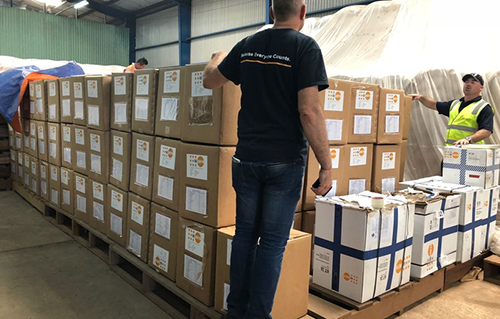Actualización
Australia supports UNFPA response to dam collapse in Lao People's Democratic Republic
06 Ago 2018
Actualización
06 Ago 2018
With assistance from the Government of Australia, pre-positioned UNFPA supplies are reaching women and girls affected by the devastating dam collapse in Attapeu Province, southern Lao People’s Democratic Republic. Triggered by heavy rain and flooding brought by Tropical Storm Son-Tinh, the 23 July collapse has affected over 13,000 people, over 6,000 of whom were displaced from their homes.
Within 48 hours of the Government of Lao PDR’s request for international assistance, dignity kits and clean delivery kits from UNFPA were among relief supplies arriving on a Royal Australian Air Force plane at the country’s Pakse airfield.
UNFPA and the Australian Department of Foreign Affairs and Trade (DFAT) have long partnered on humanitarian response in Asia and the Pacific, in the wake of disasters triggered by natural hazards and other crises. Australia has supported the strategic pre-positioning of UNFPA supplies at a warehouse in Brisbane, which makes it easier to ship them quickly across the region when required.

Clean delivery kits contain supplies that help ensure safer pregnancy and childbirth for women in situations where health facilities have collapsed or are difficult to reach. Dignity kits provide basic necessities to support women’s health and hygiene needs, including menstrual pads and clean clothes.
Menstruating women and girls caught up in humanitarian crises are often unable to move around freely, which makes it hard for them to access food, water and other essential aid. Crises also exacerbate the threat of gender-based violence – and so dignity kits provide whistles and flashlights to enable women and girls to signal for assistance.
Speaking at the airfield as UNFPA supplies arrived in the country, Jean-Bernard Carrasco, Ambassador of Australia to Lao PDR, emphasized the urgency of getting supplies to the people most in need, “in particular women and girls, because they’re often the most vulnerable here.”